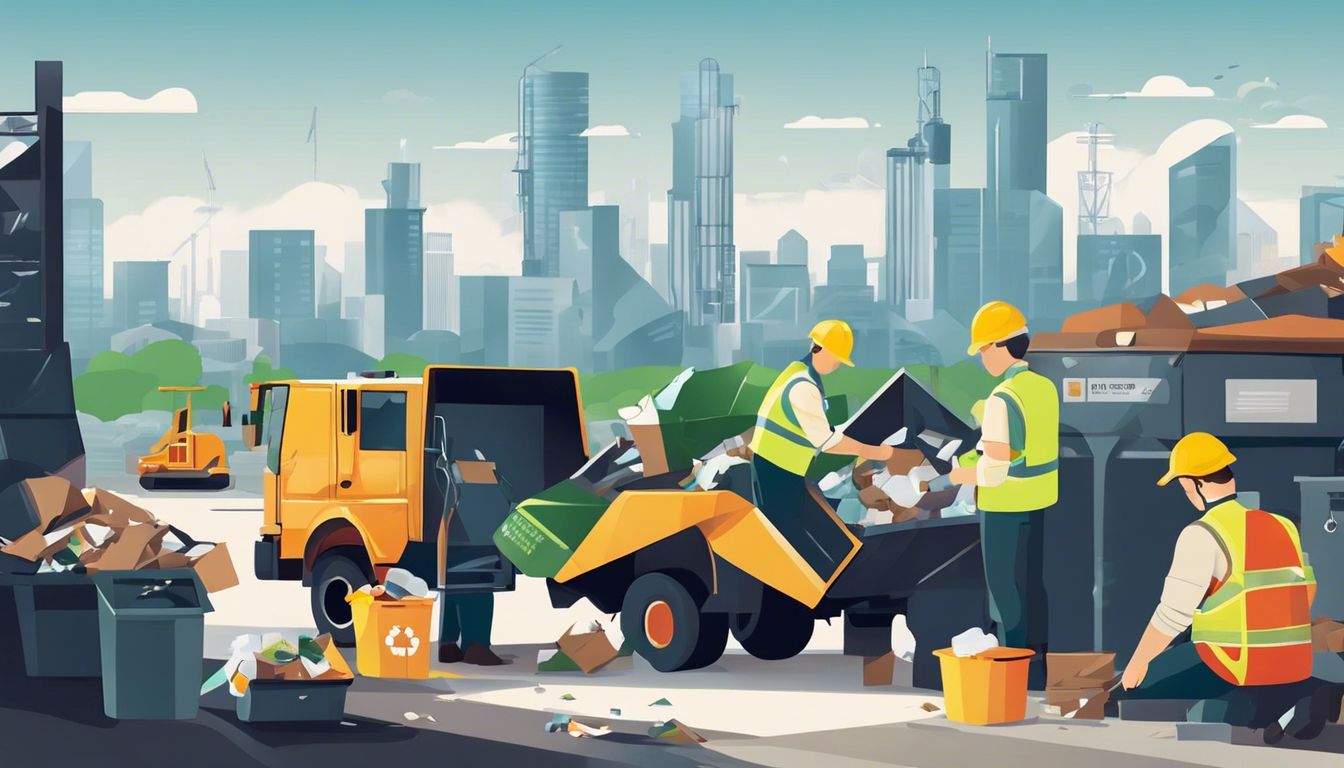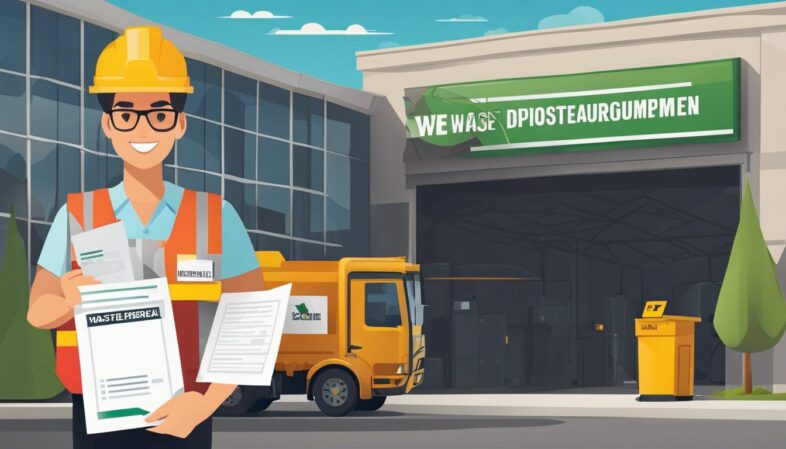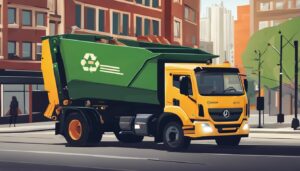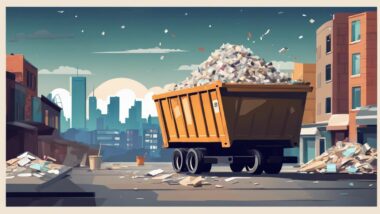Starting a waste disposal company means joining a big industry worth $52 billion. This type of business handles things like old electronics, leftover food, building scraps, and medical rubbish.
Every year in the US, people throw away over 292 million tons of stuff so it is no wonder that we often get asked how to start a waste disposal company! To manage this waste well, you need big trucks, special bins, protective gear for workers, and places to sort it all out—either dumping or recycling.
The rules for running this kind of company are strict; you need the right papers from your state to be legal. Most companies use names that stick in your mind and say what they do.
They register as an LLC or by themselves. Technology helps too — things like OptimoRoute make picking up trash smoother and quicker.
To tell people about your new business and get customers, having a website is key. Talking with other local companies can help too. Money is important at the start to buy everything you need and follow all the laws; so getting money (investment capital) from somewhere else can give you a good push.
The way forward has always has its challenges — lots of competition, high costs to start up and keep going plus tight rules can make things tricky sometimes.
Running this kind of business takes hard work but also needs flexibility if rules change or problems pop up.
Let's dig into how to build your own waste disposal empire step by step!
Key Takeaways: How to Start a Waste Disposal Company
- Starting a waste disposal company requires choosing a specialisation that can be recycled like electronic or medical waste to stand out in the market.
- Essential steps include conducting market analysis, registering the business properly, securing funding and investments, and obtaining necessary permits and licences.
- Investing in the right equipment is key for operations; this includes buying reliable trucks, safety gear for employees, recycling machinery, and software for route planning.
- Hiring qualified staff with appropriate training ensures efficient service delivery while adhering to health and safety regulations.
- Implementing innovative marketing strategies will help attract customers; building an online presence through websites and social media is crucial alongside networking with local businesses.
Choosing Your Waste Management Specialisation

In the competitive landscape of waste management, selecting your niche is crucial; it acts as a compass guiding your business towards targeted services and clientele. Your choice sets the foundation for all subsequent decisions, from equipment purchases to marketing strategies—ultimately carving out your place within this essential industry.
Food Waste Management
Managing food waste is a critical step towards sustainability. Your company can lead the way by turning restaurant leftovers and grocery store spoilage into valuable resources. Think composting, anaerobic digestion—and the business opportunities they bring.
These processes not only reduce landfill use but also create energy and nutrient-rich soil additives.
Food industries are constantly on the lookout for efficient waste solutions; your services could be just what they need. Show them how you can cut their costs and benefit the environment with innovative waste management methods.
Keep in mind, strict regulations govern food disposal practices, so stay informed and compliant to avoid any pitfalls. Link up with local farms and community programs—for them, your trash is a treasure trove that helps feed those in need or enrich soils.
Next on our agenda is diving into another lucrative niche: electronic waste management.
Electronic Waste Management
Electronic waste management stands out as a vital niche in the sprawling waste management industry. Specializing in this area can set your company apart from general rubbish handlers.
It's all about dealing with discarded electronics—things like old computers, TVs, and phones that can't just be tossed into landfills due to their hazardous materials. Handling these items needs serious investment in both high-tech equipment and expertise.
Getting it right means blending sharp business acumen with a keen eye on environmental responsibility. Operational efficiency is key, especially as you navigate the strict regulations that govern electronic waste disposal.
One smart move could be implementing route planning software for managing pick-ups and drop-offs smoothly. This kind of tech solution turns complex logistics into an easier part of the day-to-day running of your business, helping to control start-up costs while keeping customer service top-notch.
Construction Waste Management
Shifting gears from electronics, let's tackle construction waste management. This area is huge in the waste industry. Managing debris from building sites means dealing with a mix of materials – some can be recycled, while others must be disposed of safely.
Managers need to sort out wood, concrete, metals and more. They also have to think about where this stuff will go next.
Good tools make the job easier. Think heavy-duty gloves for safety and shovels for loading up those big skips. But it's not just about gear; it's also about smart planning. Route optimisation software does wonders here by saving time and fuel when collecting waste from different construction sites.
Efficient routes mean less money spent on petrol and more jobs done in a day!
Medical Waste Management
Medical waste management requires careful handling and expertise and recycling opportunities will be necessarily limited.
As a company specialising in this field, you're dealing with hazardous waste that can harm people and the environment.
Your business plan must address proper collection, disposal, and safety measures for items like syringes, gloves, and other biomedical waste.
Investing in the right equipment is crucial; specialized trucks for safe transportation and technologies that ensure compliance are non-negotiable. You'll need efficient vehicles to manage routes effectively while keeping costs down.
Seeking funds from venture capital firms or securing business loans may help scale these operations. Make sure your staff are well-trained; they must understand protocols around medical disposals to avoid risks of contamination or legal issues.
With demands high for such services, setting up robust systems will keep your company at industry standards and ready for growth opportunities.
Market Analysis in the Waste Management Industry

Understanding the waste management industry's trends and demands is vital. Look at the different sectors, such as construction, electronic, and medical waste.
Each one has specific needs and regulations you must know about. For the UK look at their recyclable materials pricing data section to get an idea of which materials can be sold for good money.
Use market research to learn what services are in high demand. This helps you find your niche.
Keep an eye on your competition too. Check their services, prices, and customer feedback. Learn from their successes and mistakes to improve your own business strategy. Remember that social media platforms can be great tools for this kind of research—use them to gauge brand awareness and consumer behavior.
Registering Your Waste Disposal Business
After examining the market, it's time to make your waste disposal business official. The right registration sets a solid foundation for all future operations. Here's how to get started:
- Decide on your business structure. Choose between an LLC and a sole proprietorship based on your needs.
- Pick a unique name that reflects your specialisation in waste management. This helps customers remember you.
- Get a tax identification number from the government. You'll need this for tax returns and corporate taxes.
- Apply for business insurance to protect against accidents or disasters.
- Secure a domain name and set up website hosting for your online presence.
- Create professional business cards for networking purposes.
- Develop an accounting system to manage finances, including personal income, equity, and dividends.
- Understand local regulations regarding waste removal services to ensure compliance from the start.
Securing Investment and Funding
Now that your waste disposal business is registered, let's focus on the crucial step of securing investment and funding. This phase will fuel your company's growth and help you manage initial expenses.
- Venture capitalists are a great resource for substantial funding. Present a solid business plan to show potential for high returns.
- Consider partnerships with established firms for financial support. Offer them a stake in your business for their investment.
- Apply for government grants aimed at environmental businesses. These can provide a financial boost without giving away equity.
- Launch a crowdfunding campaign to raise money from the public. Be transparent about goals and offer incentives for contributions.
- Look into small business loans from banks, especially those with favourable terms for green initiatives.
- Approach angel investors who have an interest in waste management and sustainability efforts.
- Explore the possibility of getting financial aid from industry – specific ventures like Republic Services.
- Assess tax benefits available for waste recycling companies. Some countries offer deductions that can ease the burden on your finances.
- Use personal income as seed money to get things off the ground if other options look uncertain or insufficient.
- Don't forget to budget carefully — maintain strong gross margins by keeping close track of start – up and operational costs.
Acquiring Necessary Permits and Licences
- Research local laws: Every area has its own rules about waste management. Find out what your state requires. This could include specific waste disposal regulations or environmental protection laws.
- Apply for a business licence: You'll need this to legally run your company. Check with your city or county government office to learn what’s needed.
- Get environmental permits: These are crucial because waste disposal can affect the environment. Your state environmental agency can guide you on which permits you must have.
- Obtain transportation licences: If you will move waste, check if you need special transport permits. This often includes getting a commercial driver's licence for your drivers.
- Look into health and safety certification: Handling certain types of waste, like medical or construction debris, may require extra training and certification for safety reasons.
- Ensure zoning compliance: Your business location must be zoned correctly for waste management operations. Talk to local planning authorities to confirm this.
- Register for taxes: As a new business owner, you’ll have to register with tax authorities. Keep in mind personal income tax, self-employed contributions, and any other relevant taxes.
- Plan for routine inspections: Regular checks from health, safety, and environmental agencies will happen. Prepare by keeping operations up to code at all times.
Purchasing Essential Equipment for Waste Management
Starting a waste disposal company means buying the right equipment. You'll need tough trucks, dumpsters, and recycling gear to get started.
- Find heavy – duty trucks that can handle all types of waste materials. Make sure they have powerful engines to drive through rough landfill terrain.
- Invest in dumpsters and roll – off containers of various sizes. Small ones work for regular rubbish pickup, while large ones are good for construction sites.
- Get safety gear for your team. Items like gloves, boots, hard hats, and high-visibility vests keep them safe on the job.
- Look into specialised recycling equipment. This might include balers, compactors, and sorting machines that help turn waste into resources.
- Purchase landfill equipment if you're managing your own disposal site. Bulldozers, compactors, and excavators are essential for moving and managing waste.
- Choose software for route planning. It helps drivers pick the fastest ways to get around town and save fuel.
- Consider a fleet management system as well. It tracks your trucks and improves overall operations efficiency.
- Set up bins or containers for separating recyclables at the source — homes or businesses. Label them clearly so people know what goes where.
- Think about getting a vehicle maintenance setup too. Regular checks keep your trucks running longer without trouble.
Employing Qualified Staff
Hiring the right team is vital for running a successful waste disposal business. You want people who understand the importance of safety and compliance in handling waste.
- Focus on qualifications that match your specialisation, such as food or medical waste management.
- Look for candidates with experience in waste disposal or environmental services.
- Ensure staff have appropriate health and safety training to handle hazardous materials.
- Check references thoroughly to confirm past employment and reliability.
- Offer competitive salaries and benefits to attract top talent in the industry.
- Invest in ongoing training programmes to keep your team updated on new regulations.
- Create clear job descriptions so potential employees know what you expect from them.
- Promote a strong company culture that values teamwork and employee satisfaction.
Marketing Strategies for Your Waste Disposal Business
To carve out a niche in the crowded waste disposal market, innovative marketing strategies are paramount; Discover how our Shropshire Business Marketing service illuminates the path to capturing your target audience's attention and setting your business apart.
Building an Online Presence
Building an online presence is crucial for your waste disposal business. Start by creating a professional website that showcases your services and expertise in areas like food, electronics, and construction waste management.
Make sure it’s easy to navigate and offers customers all the information they need about what you do.
Next, set up a Google My Business page—it will help people find you when they search for waste management services nearby. Add your company to online directories too; this increases visibility and credibility.
On social media platforms such as Facebook, craft a business page where you can share updates, interact with clients, and broaden your reach with targeted advertising campaigns.
Investing in paid marketing efforts like Google Ads can drive more traffic to your site—focus on keywords related to animal waste management or B2B marketing for better results. Use social media advertising tactically by targeting ads toward company waste managers looking for reliable collection services.
Offer discount codes or promote recycling programs through pay-per-click ads to track cost per conversion effectively.
Now move forward confidently into networking with potential clients and local businesses, making connections that could turn into contracts.
Networking with Customers and Local Businesses
After establishing an online footprint, shift focus towards making real-world connections. Forge ties with local companies and engage directly with customers to expand your business network.
Attend community events, join trade associations, and set up meetings to present waste management solutions. By doing so, you become a familiar face on the local scene, – vital for securing contracts.
Make sure every interaction counts by showing stellar customer service every time. Listen carefully to the client's needs and respond quickly when they reach out. A satisfied customer is more likely to recommend your services to others.
Partner with businesses that complement your waste disposal company—this could lead to new opportunities and mutual growth. Remember, strong relationships drive the wheels of success forward in any industry, especially waste management, where reliability is key.
Incorporating Recycling Programmes: Learning from Top Firms
Top firms show us that recycling programmes are a key part of waste management success. They focus on turning what was once “dumped” into valuable resources. These companies invest in research to find the best ways to recycle different materials.
By doing this, they save money and help the environment.
Your waste disposal business can follow their lead. Start by setting up clear systems for sorting and processing recyclables. Work with local businesses to collect their recyclable waste efficiently.
Use social media platforms like Twitter and Pinterest to spread the word about your recycling efforts. This will attract eco-conscious customers and set you apart from competitors.
Addressing Challenges in the Waste Management Industry
Navigating the waste management industry comes with its own unique set of hurdles, from regulatory compliance to intense market competition. Understanding these challenges is essential for devising strategies that not only mitigate risks but also capitalise on the opportunities they present.
Strict Regulations
Strict regulations in the waste management industry ensure safe and responsible handling of waste. As a small business owner, you must stay informed about these rules. Government agencies set strict guidelines for collecting, transporting, and disposing of waste.
For your new venture to operate legally, registering your business is just step one.
Next comes navigating the permitting landscape; this part can often feel overwhelming. Essential paperwork includes environmental licenses and health department approvals. You will also need special permissions for certain types of waste like medical or construction debris.
Remember that companies with their own landfill sites are ahead since they avoid paying tipping fees to others.
Staying on top of these regulations means your business avoids hefty fines and shutdowns. Your compliance maintains your professional reputation among customers and within the B2B marketplace.
Keep all documentation current by submitting income tax returns on time and renewing licenses as required.
It's crucial to understand each regulation that applies to your chosen specialty—whether it’s e-waste or food scrap disposal. Build strong relationships with local authorities; this helps when you seek advice or face inspections.
Your knowledge of strict laws shows company waste managers that you're serious about winning tenders for their business needs.
High Start-up and Operational Costs
Running a waste disposal company means you'll face hefty expenses early on. The cost of trucks, bins, and other equipment can be high. You'll also need to invest in technology to keep track of your operations.
It's not just the initial costs that are big. Everyday running costs like fuel, maintenance, and staff wages add up too.
To manage these costs, creating a detailed business plan is vital. In it, outline all expected expenses and how you plan to cover them. Look into different funding options such as securing investment from VCs or taking out a business loan.
Clever budgeting and financial planning are key for your waste management startup to thrive amidst these challenges.
Growing Competition
Many companies are diving into the waste management sector. The industry has seen a steady growth of 1.4% each year since 2015, drawing in new players eager to get their share. This makes standing out tough for startups and established businesses alike.
You must stay sharp to keep ahead of the competition. Make sure your business offers unique services or superior customer care. Use marketing firms to boost your online presence with effective keyword research and B2B strategies.
Keep an eye on trends so you can adapt quickly and remain a top choice for company waste managers looking for reliable collection services.
Inefficient Operations
Growing competition in the waste management industry often leads to a rush for cutting-edge solutions. Yet, without the right tools and methods, operations can become inefficient. Waste disposal companies may face setbacks with outdated vehicles and equipment.
This makes collection and processing slow and costly.
Businesses should invest in modern technology to streamline their services. High-quality machines sort and recycle waste faster than ever before. Smart routing software can plan better paths for trucks.
This saves time and fuel. Training staff on efficient practices is also key. With proper skills, your team will handle waste smarter, reducing errors that cause delays or hazards.
Remember: effective operations keep customers happy and costs down in your waste disposal business!
Maintaining Compliance and Business Flexibility
Staying within the law is crucial for your waste disposal business. Keep up with changing rules to avoid fines or losing your right to operate. You'll need to get familiar with both local and national laws that affect how you manage waste.
Always update your policies and train your team on new procedures.
Your company must adapt quickly to any changes in the industry. This means staying open to new methods of recycling and disposal, as well as altering your services if customer needs change.
Use technology like software for route optimisation or customer management systems; these can help you stay efficient and responsive. Keep a close eye on trends in legislation and market demands so you can pivot smoothly when necessary, ensuring long-term success.
Conclusion: How to Start a Waste Disposal Company
Diving into waste management can be a smart move with the right approach. Start by picking an area like electronic or medical waste disposal – it's crucial to stand out. Remember, having top-notch trucks and gear will set your business up for success.
Keep things above board with the right licences and stay flexible to navigate industry ups and downs. Now's the time—turn your vision of a cleaner world into reality with your own waste disposal empire!
FAQs for “How to Start a Waste Disposal Company”
1. What business structure should I choose for my waste disposal company?
You might want to consider setting up an S-corp or an LLC, as they offer benefits like liability protection and potential tax advantages.
2. Who are my potential clients in the waste disposal business?
Your clients can vary; you could work with other businesses (business-to-business, B2B) or directly with consumers (B2C). It's a mix offering plenty of opportunities.
3. Do I need a marketing plan when starting out?
Absolutely, yes! A solid marketing plan helps spread the word about your services. Think about creative ways to engage potential clients—maybe even craft a clever tweet or two!
4. Can an illustrator help with my waste disposal company’s branding?
Indeed, they can! An illustrator could give your brand that extra edge with unique visuals that make your waste disposal company stand out from the rest.
Cost of Commercial Waste Disposal UK: Keeping the Numbers Low: What UK Rubbish Really Costs
Managing rubbish costs money. UK companies know this too well, as they deal with heaps of trash every day. Every year, these businesses create 27.5 million tonnes of commercial waste and 13.6 million tonnes of industrial waste – that's a mountain weighing 41.1 million tonnes! Tossing all that waste can eat up to 4-5% of […]
e-waste recycling companies for businesses: No Digital Dumping. Instead apply the best E-Waste Solutions
E-waste recycling for businesses is a big deal. It's about getting rid of old electronics the right way. In 2016, we had 44.7 million tons of e-waste around the world, but only a bit got recycled properly. That's not good because this stuff has harmful things like mercury and lead that can hurt our planet […]
Comparing US Waste Disposal Companies: Top Landfill Waste Competitors: The Ultimate Eco Disposal Company Showdown
Waste disposal companies play a big role in how we take care of our planet. They handle the trash and recycling from homes, businesses, and cities. Some of the biggest names in this industry are Waste Management, Republic Services, Veolia North America, Rumpke Waste & Recycling, and Casella Waste Systems, Inc. These companies work to […]
Waste Companies Offering Eco-friendly Services – UK's Best Circular Economy Waste Services
Think about how we throw away stuff. Imagine if that waste could help make new things. Well, that's the mission of all waste companies offering eco-friendly services. This idea is called circular economy in waste management. It's like a loop where trash gets a new life instead of hurting our planet. In the UK, some […]









